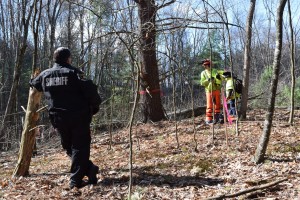
Born in Budapest, 85-year-old Steven Gerhart fled to the United States in 1957 after surviving Europe’s most brutal regimes. His adopted country was undoubtedly a refuge from injustices and cruelties suffered under the Nazi occupation of Hungary, the Communist takeover and the Soviet crackdown on rebellion. In turn, Gerhart with his wife Ellen created a sanctuary for wildlife with the purchase of land in Pennsylvania in 1982.
Now their property—a heavily forested hillside of century-old trees—is in the way of a gas company’s profitable enterprise. Without negotiating a settlement, Sunoco Logistics Partners this week clear-cut the land on three acres of the Gerhart property for the Mariner East 2 pipeline.
Courts and state agencies have smoothed the way for Sunoco and ordered local law enforcement to escort the company’s crews onto the property. Observers have been arbitrarily arrested and held under punitive bail.
In his youth, Gerhart lived through World War II, Nazi fascism and Soviet Communism and narrowly escaped. But it seems that in old age, he cannot escape a different form of tyranny under the capitalist system.
“He came to this country and had to start a new life,” says daughter Elise. “Eventually, he was able to work hard enough to get this piece of property with my mom. He thought he had found some peace, and they’re taking that all away from him.”
Chainsaw Crew Protected by Police
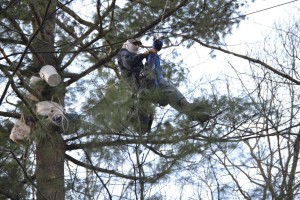
Sunoco was keen to beat a March 31st deadline before a wildlife migration law prevents trees from being cut down. The company filed for an emergency injunction to proceed with clear-cutting on the Gerhart property, which a local judge issued on March 28.
Allies arrived to support the Gerharts and observe the chainsaw-wielding crews. A few opted to obstruct and delay the cut by climbing the trees, including Elise Gerhart, who perched on a platform high in the evergreens. The trees with climbers were tied to other trees.
Sheriff’s deputies escorted Sunoco’s hired contractors onto the property. When the crew cut down one of the tied trees, observer Liz Glunt feared for the tree-sitters’ safety. She crossed into the right-of-way, and the Altoona resident was arrested and charged with contempt of a civil order. They also arrested Alex Lotorto from Milford, PA who had not interfered or entered the right-of-way but may have been targeted because he carried a walkie-talkie.
The sheriff was intent on a heavy-handed approach, according to Megan Holleran. “They informed us, if we wanted to play it that way, they would be more aggressive with arrests,” she said.
On the second day of cutting, Steven Gerhart’s wife Ellen was arrested. The crew began cutting close to the tree-sitters and even felled a small tree which bounced off the line which her daughter was attached to. Then a tree on its way down brushed the branches of the tree which supported the platform. Ellen Gerhart contends that she pointed out to officers that she was not in the right-of-way, but when the loggers moved away, the officers arrested her for being “in the danger zone.”
At arraignment, Glunt and Lotorto were slammed with an astoundingly high bail of $100,000 per charge. Glunt and Ellen Gerhart were released, but Lotorto remains in jail with $200,000 bail. He faces an additional charge of misdemeanor disorderly conduct.
None of the tree-sitters were arrested, but Ellen Gerhart fears that a warrant may have been issued for her daughter’s arrest. A dozen trees remain standing where Elise and the other tree-sitters held vigil. If a Sunoco crew comes back to cut them down, they will be fined. A lawyer advised Ellen Gerhart, however, that Sunoco might try to pass the fine on to Elise for obstructing them.
Eminent Domain for Private Gain
“The rich executives of Sunoco have decided that they can make a lot more profit by selling the Natural Gas Liquids overseas,” Steven Gerhart wrote in a letter to Huntingdon County Judge George N. Zanic, the judge who granted Sunoco’s emergency injunction. “It is unjust to give them the right of eminent domain so that they can trample on the rights of the people of Pennsylvania.”
Sunoco is a subsidiary of Dallas-based Energy Transfer Partners, which has contracted with European petrochemical companies for the future capacity of the pipeline, 275,000 gallons per day of natural gas components ethane, butane and propane. A company is supposed to demonstrate public interest before it can take private property. But the Mariner East 2 would only extract resources from Pennsylvania without providing residents any benefits in return.
The 350-mile pipeline is affecting thousands of other landowners in Pennsylvania. Some have bowed to pressure and taken low-ball compensation offers, while others like the Gerharts have refused and face eminent domain proceedings.
State agencies are complicit. The Public Utility Commission granted Sunoco the power of eminent domain without just compensation or public need. Another agency, the Department of Environmental Protection, has declined to intervene, even though Sunoco has not obtained water-crossing and soil erosion permits. A private consulting company hired by the Gerharts found that Sunoco reported just half the streams and only one-seventh the wetlands on the property.
Ellen Gerhart has stopped trying to find the logic in it any more. “Why are you called the DEP when you’re not out here protecting the environment?” she asks rhetorically. “They say, once a judge grants eminent domain, that gives them the right to clear cut on foot. But if they clear cut, they destroy forests. They say, ‘We can come out and see if Sunoco violated any regulations.’ But it’s after the fact. They can’t come back and glue those trees back together.”
Living Up to Promises

The Gerharts have used their private property rights for public good. After they purchased their land in 1982, they enrolled in a Pennsylvania conservation program. As Forest Stewards, they “enrich the life of their land while they enrich the lives of all who depend on forests—wildlife, humans and generations yet to come.”
“We have tried to live up to our promise made when we signed on” to the program, says Steven Gerhart. And they have. The forest, up until now, has teemed with life, sheltering animals such as deer, bear, foxes, snakes, muskrats, geese, mallards, and grouse as well as endangered plants. Among the trees felled were shagbark hickories, where the endangered Indiana bat nests.
Ellen Gerhart says they have documented numerous violations of regulations by the tree-cutters and believes they showed “total disregard” for the environmental impact they caused.
What she doesn’t mention is how Sunoco’s pipeline would put her and her husband in jeopardy.
“Their house is in what is considered to be a blast zone,” says Elise Gerhart. “When these pipeline companies come though and they lay these pipes, that ought to be considered terrorism. Because there is no difference to me, I don’t see any difference, between putting two enormous explosive pipelines through somebody’s property or planting a bomb there.”
Living, Breathing Pennsylvanians
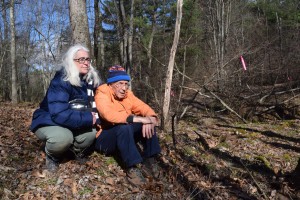
Megan Holleran, who came to support the Gerharts, shares a common bond with them. Only a few weeks ago, Williams Partners cut down five acres of prime “sugar bush” on her family’s maple syrup farm. Now the business is ruined. Williams–also owned by Energy Transfer Partners–hadn’t secured all the necessary permits for the Constitution Pipeline in the state of New York and was barred from cutting down trees there, but it got its way in Pennsylvania.
Unfortunately, the Hollerans’ and Gerharts’ experiences are hardly unique. Gas companies, in partnership with federal agencies like FERC, have bullied people around the country to get their pipelines and other gas infrastructure built. The revolt against “eminent domain for private gain” is underway.
Sunoco’s power to appropriate land reminds Steven Gerhart of his early experience in Communist Hungary:
The Soviets installed the Hungarian Communists as the government. In 1948, I was an apprentice in a one-man engraving and jewelry shop. My boss worked very hard to establish his small business. One day two Hungarian secret police, dressed like the Gestapo from years before, came in their long leather coats to the shop. They said to my boss, “This shop is now nationalized; you have to leave.” In a few minutes, my boss was gone. The “police” told me to take an inventory of the tools in the shop and they told me I would have a job in the nationalized jewelry and engraving system. By that time all major businesses, banks, and mines, were taken over by the communists. This is the way it was.
And this is the way it is now: government agencies and courts can send police to enforce their orders to take away your property and give it to private corporations for them to make a profit. Any resistance will be met will harsh and punitive measures.
“We are living, breathing Pennsylvanians who have tried to preserve this land,” Gerhart says. “Sunoco is a billions of dollar, faceless entity, based in Texas.”
You can contribute to a fund for supplies, legal expenses, and costs associated with challenging and monitoring Sunoco’s Mariner 2 Pipeline construction for environmental and safety violations here.
This work is licensed under a Creative Commons Attribution-Share Alike 3.0 License

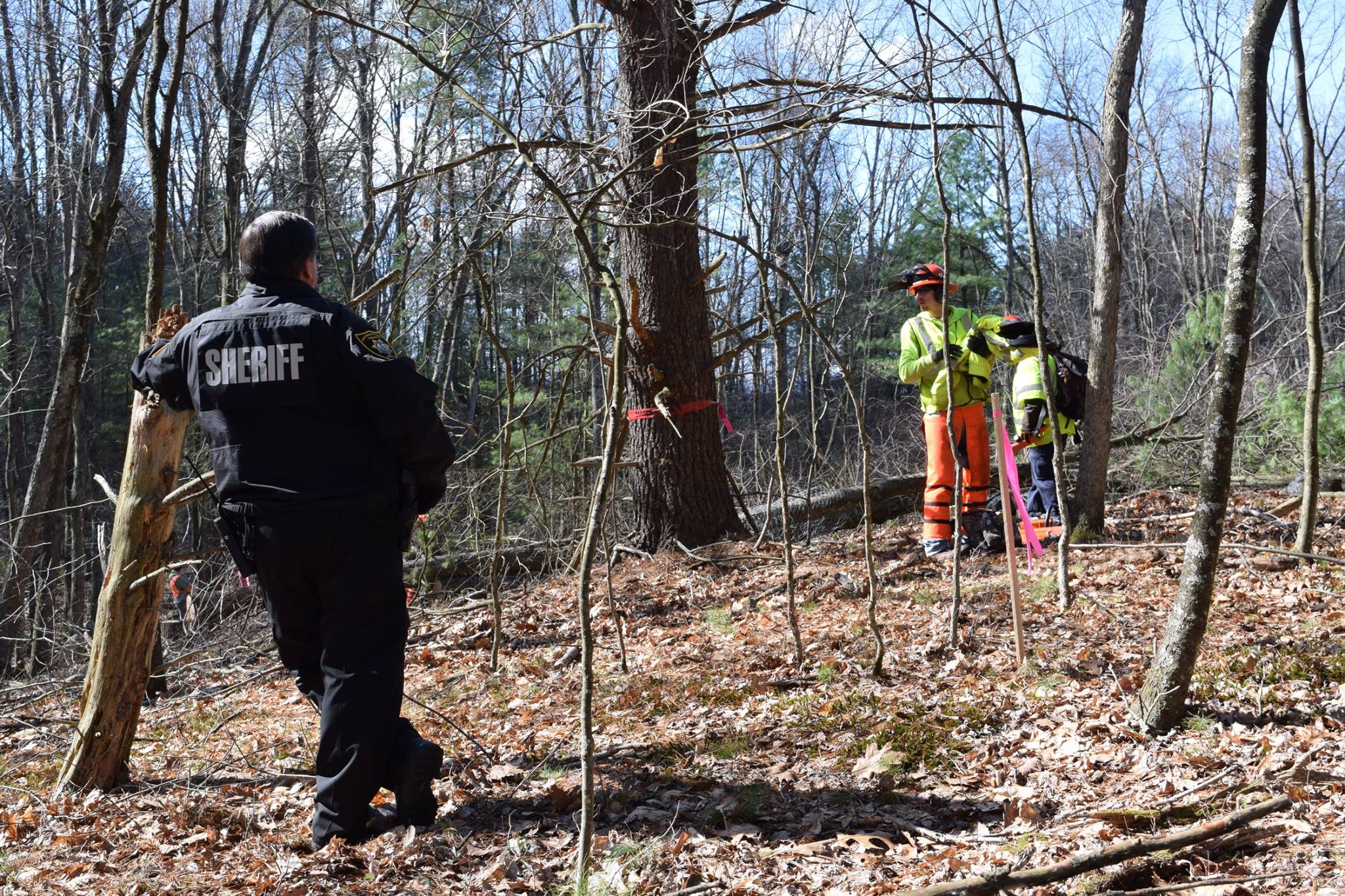
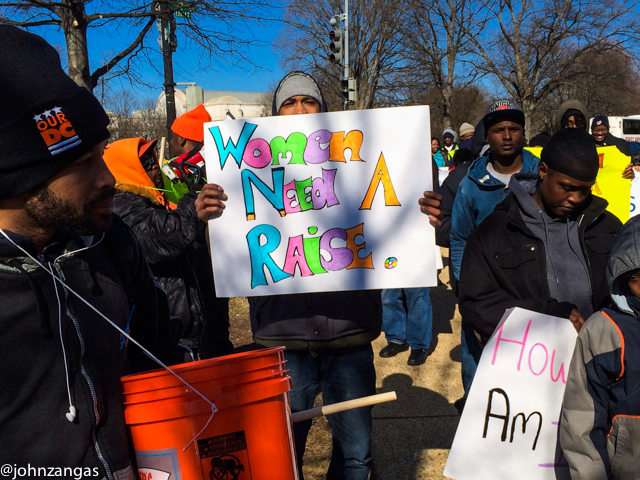

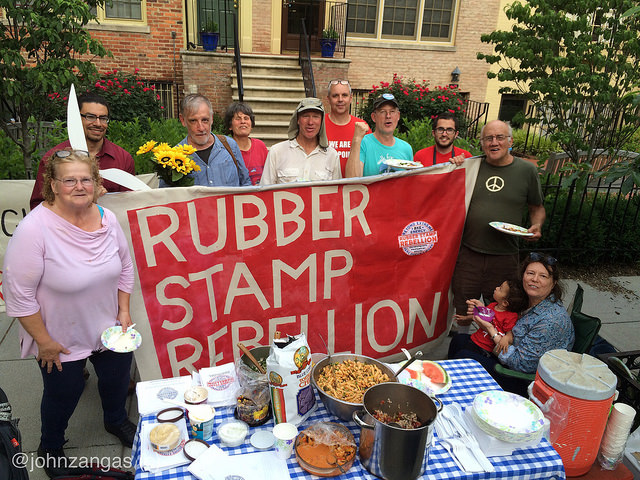
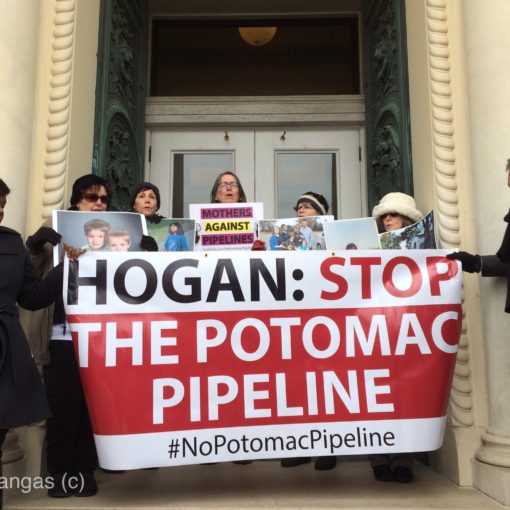
One thought on “Sunoco Gets Assist from Sheriff, Judge in Clear-Cut for Pipeline”